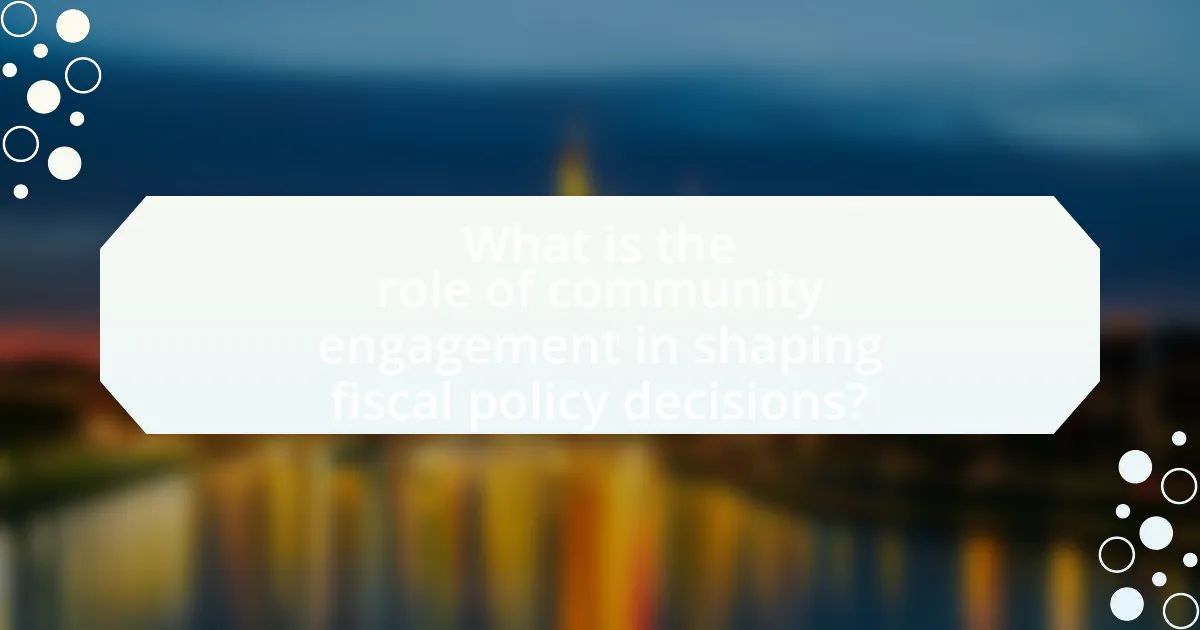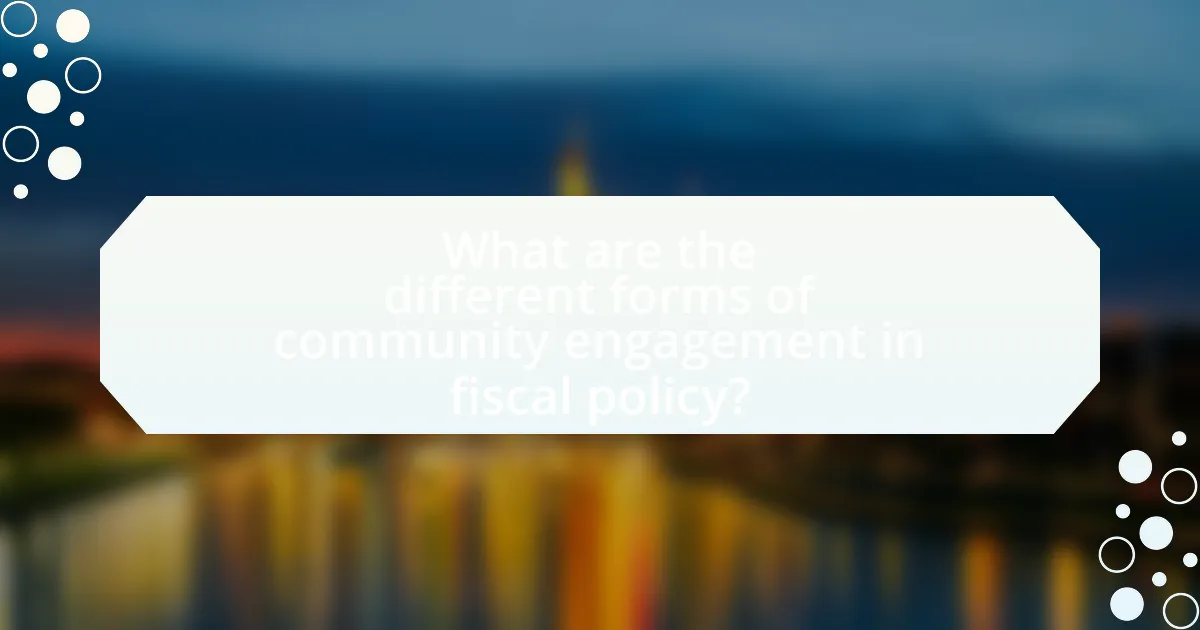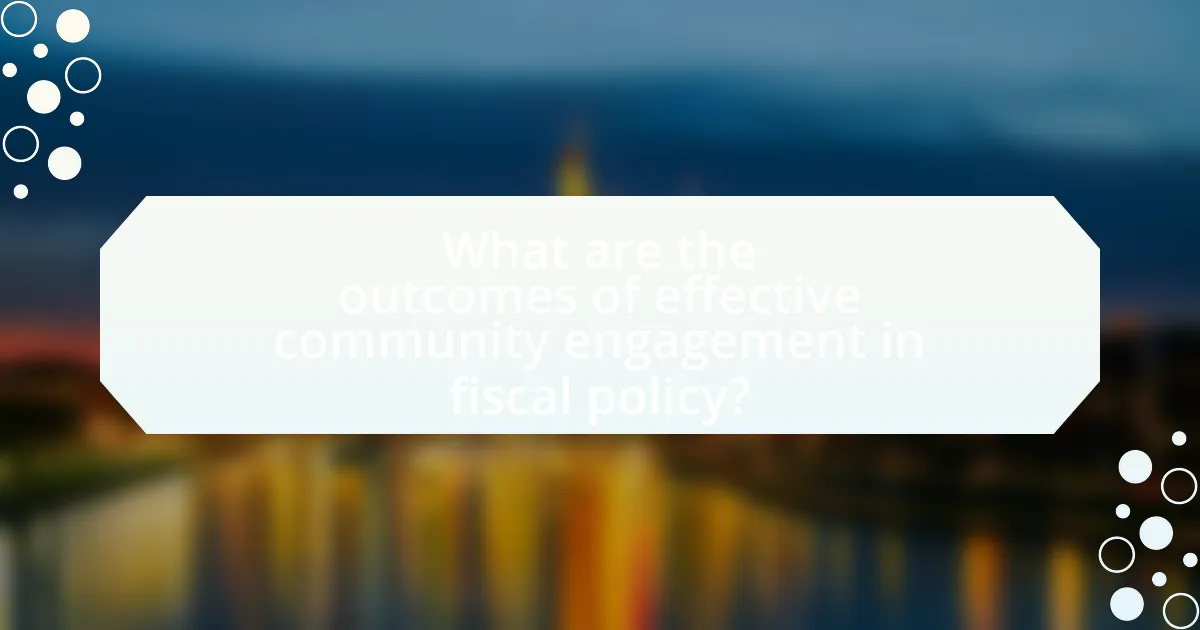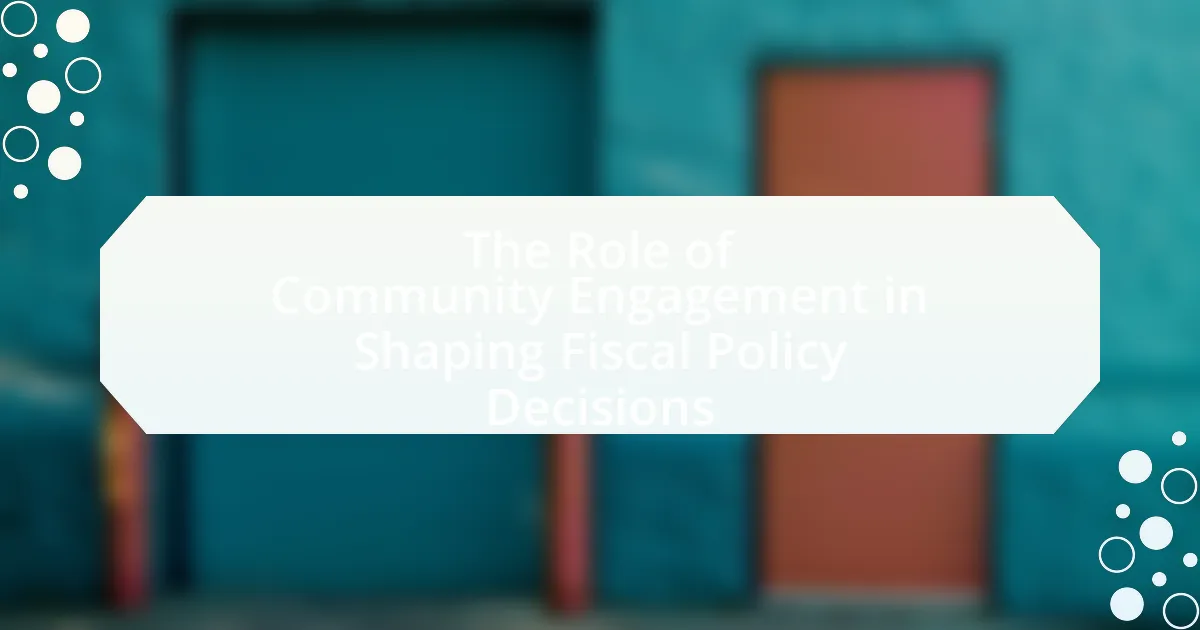Community engagement is a vital component in shaping fiscal policy decisions, as it ensures that the public’s voices and needs are integrated into the policymaking process. The article explores how community involvement enhances transparency, accountability, and responsiveness in fiscal policies, leading to more equitable resource allocation. It discusses various mechanisms of engagement, such as participatory budgeting and public consultations, and highlights the positive outcomes of effective community participation, including increased public trust and satisfaction with government services. Additionally, the article addresses the challenges faced by marginalized communities in engaging with fiscal policy and offers practical strategies for overcoming these barriers.

What is the role of community engagement in shaping fiscal policy decisions?
Community engagement plays a crucial role in shaping fiscal policy decisions by ensuring that the voices and needs of the public are considered in the policymaking process. Engaging communities allows policymakers to gather diverse perspectives, which can lead to more equitable and effective fiscal policies. For instance, studies have shown that when local governments involve citizens in budget discussions, it can result in increased transparency and accountability, ultimately leading to better allocation of resources. Research conducted by the International Budget Partnership highlights that participatory budgeting initiatives have led to improved public services and increased citizen satisfaction in various municipalities worldwide.
How does community engagement influence fiscal policy outcomes?
Community engagement significantly influences fiscal policy outcomes by ensuring that the needs and preferences of the public are reflected in budgetary decisions. When communities actively participate in the policymaking process, they provide valuable insights that can lead to more effective allocation of resources. For instance, studies have shown that municipalities with higher levels of citizen involvement in budget discussions tend to prioritize spending in areas that directly address community concerns, such as education and public safety. This alignment between community input and fiscal policy not only enhances transparency but also fosters trust in government, ultimately leading to better compliance and support for tax initiatives.
What are the key mechanisms through which community engagement affects fiscal policy?
Community engagement affects fiscal policy primarily through enhanced transparency, increased accountability, and improved responsiveness to public needs. Enhanced transparency occurs when community members participate in budget discussions, leading to clearer understanding of fiscal priorities and allocations. Increased accountability is achieved as engaged citizens hold policymakers responsible for their decisions, often resulting in more equitable resource distribution. Improved responsiveness is evident when community feedback influences policy adjustments, ensuring that fiscal measures align with the actual needs and preferences of the population. These mechanisms collectively foster a more participatory governance model, ultimately leading to more effective fiscal policies that reflect community interests.
How do community voices impact budgetary priorities?
Community voices significantly impact budgetary priorities by influencing decision-makers to allocate resources based on the expressed needs and preferences of residents. When community members engage in public forums, surveys, or advocacy efforts, they provide valuable insights that can shift funding towards essential services such as education, healthcare, and infrastructure. For instance, a study by the Urban Institute found that cities that actively incorporate community feedback into their budgeting processes tend to see increased satisfaction with public services and more equitable resource distribution. This demonstrates that when local governments prioritize community input, they are more likely to align budgetary decisions with the actual needs of their constituents, ultimately leading to more effective and responsive fiscal policies.
Why is community engagement important in fiscal policy formulation?
Community engagement is important in fiscal policy formulation because it ensures that the policies reflect the needs and priorities of the community. Engaging citizens allows policymakers to gather diverse perspectives, which can lead to more effective and equitable fiscal decisions. For instance, studies have shown that communities involved in the budgeting process are more likely to support and comply with fiscal policies, as they feel a sense of ownership and accountability. Additionally, research from the International Budget Partnership indicates that participatory budgeting can improve public service delivery and enhance trust in government, demonstrating the tangible benefits of community involvement in fiscal policy.
What benefits does community engagement bring to fiscal policy decisions?
Community engagement enhances fiscal policy decisions by ensuring that policies reflect the needs and priorities of the community. Engaging citizens allows policymakers to gather diverse perspectives, leading to more informed and effective fiscal strategies. For instance, studies have shown that jurisdictions with higher levels of community participation in budget processes often experience increased public trust and satisfaction with government services. This is evidenced by the 2015 report from the International Budget Partnership, which found that participatory budgeting initiatives led to improved allocation of resources in cities like Porto Alegre, Brazil, where community input directly influenced budgetary outcomes.
How does community engagement enhance transparency and accountability?
Community engagement enhances transparency and accountability by fostering open communication between government entities and citizens, allowing for greater scrutiny of fiscal policies. When community members actively participate in decision-making processes, they can voice concerns, ask questions, and demand clarity on how public funds are allocated and spent. This participatory approach not only empowers citizens but also compels policymakers to provide detailed explanations and justifications for their actions, thereby reducing opportunities for corruption and mismanagement. Research indicates that municipalities with higher levels of community engagement report increased public trust and satisfaction with local governance, demonstrating a direct correlation between citizen involvement and enhanced accountability in fiscal matters.
What challenges exist in integrating community engagement into fiscal policy?
Integrating community engagement into fiscal policy faces several challenges, primarily including lack of resources, differing priorities, and limited access to information. Resource constraints often hinder the ability of local governments to facilitate meaningful engagement, as they may lack funding or personnel to conduct outreach effectively. Differing priorities between community members and policymakers can lead to conflicts, making it difficult to align fiscal decisions with community needs. Additionally, limited access to information can prevent community members from fully understanding fiscal policies, which diminishes their ability to engage constructively. These challenges are documented in studies such as “Community Engagement in Fiscal Policy: Barriers and Opportunities” by the Urban Institute, which highlights the importance of addressing these obstacles to enhance participatory governance.
What barriers do communities face in participating in fiscal policy discussions?
Communities face several barriers in participating in fiscal policy discussions, including lack of access to information, limited understanding of fiscal processes, and insufficient representation in decision-making bodies. Access to relevant data is often restricted, making it difficult for community members to engage meaningfully. Additionally, many individuals lack the necessary knowledge about fiscal policies, which can deter participation. Furthermore, marginalized communities frequently experience underrepresentation in governmental and advisory roles, leading to their voices being overlooked in policy discussions. These barriers collectively hinder effective community engagement in shaping fiscal policy decisions.
How can policymakers overcome resistance to community engagement?
Policymakers can overcome resistance to community engagement by actively involving community members in the decision-making process and demonstrating the tangible benefits of their participation. Engaging communities through transparent communication and inclusive practices fosters trust and encourages collaboration. For instance, studies show that when local governments implement participatory budgeting, community members feel more invested in fiscal decisions, leading to increased support for policies. This approach not only enhances the legitimacy of the policymaking process but also results in more effective and relevant fiscal policies that reflect the needs of the community.
How can community engagement be effectively implemented in fiscal policy processes?
Community engagement can be effectively implemented in fiscal policy processes through structured participatory mechanisms that include public consultations, stakeholder workshops, and feedback loops. These mechanisms allow citizens to voice their needs and priorities, ensuring that fiscal policies reflect community interests. For instance, the World Bank’s “Participatory Budgeting” initiative has demonstrated that involving citizens in budget decisions leads to more equitable resource allocation and increased public trust in government. By integrating community input into fiscal planning, policymakers can create more responsive and effective fiscal policies that address the specific needs of the population.
What best practices can be adopted for successful community engagement?
Successful community engagement can be achieved by fostering open communication, ensuring inclusivity, and building trust. Open communication involves actively sharing information and encouraging feedback, which helps community members feel valued and informed. Inclusivity ensures that diverse voices are represented, allowing for a broader range of perspectives and ideas, which is crucial in shaping effective fiscal policies. Building trust through consistent and transparent actions strengthens relationships between policymakers and the community, leading to more collaborative efforts. Research indicates that communities with strong engagement practices are more likely to support and participate in fiscal initiatives, as seen in the case of participatory budgeting in various cities, which has led to increased public investment in community priorities.
How can technology facilitate community participation in fiscal policy?
Technology can facilitate community participation in fiscal policy by providing platforms for transparent communication and engagement. Digital tools such as online surveys, social media, and budgeting software enable citizens to express their opinions, access information, and contribute to decision-making processes. For instance, participatory budgeting platforms allow communities to propose and vote on budget allocations, enhancing civic involvement. Research by the Participatory Budgeting Project shows that cities implementing these technologies have seen increased public engagement and satisfaction with fiscal decisions. This demonstrates that technology not only streamlines communication but also empowers communities to actively shape fiscal policies.

What are the different forms of community engagement in fiscal policy?
Different forms of community engagement in fiscal policy include public consultations, participatory budgeting, community advisory boards, and stakeholder meetings. Public consultations allow citizens to provide input on budget priorities and fiscal decisions, fostering transparency and accountability. Participatory budgeting empowers community members to directly influence how public funds are allocated, enhancing civic participation. Community advisory boards consist of local representatives who advise policymakers on fiscal matters, ensuring that diverse perspectives are considered. Stakeholder meetings bring together various interest groups to discuss fiscal policies, promoting collaboration and informed decision-making. These engagement methods are essential for aligning fiscal policies with community needs and preferences.
What types of community engagement strategies are commonly used?
Commonly used community engagement strategies include public meetings, surveys, focus groups, and participatory budgeting. Public meetings allow community members to voice their opinions and ask questions directly to decision-makers, fostering transparency and dialogue. Surveys gather quantitative data on community needs and preferences, enabling policymakers to make informed decisions. Focus groups provide qualitative insights by facilitating in-depth discussions among diverse community members, helping to identify specific concerns and priorities. Participatory budgeting empowers residents to directly influence how public funds are allocated, enhancing civic involvement and accountability. These strategies are effective in ensuring that community voices are heard in fiscal policy decisions, ultimately leading to more equitable and representative outcomes.
How do public consultations shape fiscal policy decisions?
Public consultations shape fiscal policy decisions by incorporating community feedback into the policymaking process. This engagement allows policymakers to understand the needs and priorities of the public, leading to more informed and representative fiscal policies. For instance, studies have shown that jurisdictions that actively engage citizens in budget discussions often see increased public satisfaction and trust in government, as evidenced by the participatory budgeting initiatives in cities like Porto Alegre, Brazil, which resulted in more equitable resource allocation. By integrating public input, governments can align fiscal policies with the actual demands of their constituents, ultimately enhancing the effectiveness and legitimacy of those policies.
What role do community advisory boards play in fiscal policy development?
Community advisory boards play a crucial role in fiscal policy development by facilitating direct communication between policymakers and the community, ensuring that diverse perspectives are considered in financial decision-making. These boards gather input from various stakeholders, including residents, local organizations, and businesses, which helps to identify community needs and priorities. For instance, research has shown that when community advisory boards are involved, policies are more likely to reflect the actual needs of the population, leading to more effective allocation of resources. This engagement can enhance transparency and accountability in fiscal policy, as community members feel empowered to voice their concerns and influence decisions that affect their lives.
How do different communities engage with fiscal policy?
Different communities engage with fiscal policy through public consultations, advocacy groups, and participatory budgeting initiatives. Public consultations allow community members to voice their opinions on budget priorities, influencing local government decisions. Advocacy groups, such as those focused on social justice or environmental issues, mobilize residents to campaign for specific fiscal policies that align with their interests. Participatory budgeting initiatives enable residents to directly decide how a portion of the budget is allocated, fostering a sense of ownership and accountability. For example, in New York City, participatory budgeting has led to increased funding for community projects based on resident input, demonstrating the tangible impact of community engagement on fiscal policy.
What unique challenges do marginalized communities face in fiscal policy engagement?
Marginalized communities face unique challenges in fiscal policy engagement, primarily due to systemic barriers such as lack of access to information, limited representation in decision-making processes, and socioeconomic disparities. These communities often lack the resources to effectively advocate for their interests, resulting in underrepresentation in fiscal discussions that directly affect their lives. For instance, a report by the National Community Reinvestment Coalition highlights that communities of color are frequently excluded from public budget discussions, leading to policies that do not address their specific needs. Additionally, language barriers and distrust in government institutions further hinder their ability to engage meaningfully in fiscal policy processes.
How can diverse community perspectives be integrated into fiscal policy?
Diverse community perspectives can be integrated into fiscal policy through structured engagement processes, such as public consultations, surveys, and participatory budgeting. These methods allow policymakers to gather input from various demographic groups, ensuring that the fiscal policies reflect the needs and priorities of the entire community. For instance, cities like New York and Paris have successfully implemented participatory budgeting, where residents directly influence budget allocations, leading to more equitable and representative fiscal decisions. This approach not only enhances transparency but also fosters trust between the government and the community, ultimately resulting in policies that are more aligned with the diverse interests of the population.

What are the outcomes of effective community engagement in fiscal policy?
Effective community engagement in fiscal policy leads to improved transparency, increased public trust, and enhanced policy outcomes. When communities actively participate in fiscal decision-making, they contribute valuable insights that reflect their needs and priorities, resulting in policies that are more aligned with the public interest. Research indicates that jurisdictions with strong community engagement practices experience higher levels of citizen satisfaction and better allocation of resources, as evidenced by studies showing that participatory budgeting initiatives can lead to more equitable funding distributions and increased civic participation.
How does community engagement lead to better fiscal policy decisions?
Community engagement leads to better fiscal policy decisions by ensuring that the perspectives and needs of the public are incorporated into the decision-making process. When policymakers actively involve community members, they gain valuable insights into local priorities and challenges, which can inform more effective allocation of resources. For instance, a study by the National League of Cities found that cities with strong community engagement practices reported higher satisfaction with local government services and more effective fiscal outcomes. This engagement fosters transparency and accountability, as citizens feel more invested in the outcomes and are more likely to support policies that reflect their interests.
What evidence supports the positive impact of community engagement on fiscal outcomes?
Community engagement positively impacts fiscal outcomes by enhancing transparency, accountability, and trust in government processes. Research conducted by the National Civic League indicates that municipalities with higher levels of community engagement experience improved budgetary outcomes, as citizens are more likely to support tax initiatives when they feel involved in decision-making. Additionally, a study published in the Journal of Public Administration Research and Theory found that participatory budgeting initiatives led to more equitable allocation of resources, resulting in increased public satisfaction and compliance with fiscal policies. These findings demonstrate that active community involvement can lead to more effective fiscal management and better financial outcomes for local governments.
How can community engagement improve public trust in fiscal policy?
Community engagement can improve public trust in fiscal policy by fostering transparency and accountability in decision-making processes. When citizens actively participate in discussions about fiscal policies, they gain insights into how decisions are made and how funds are allocated, which demystifies governmental actions. Research indicates that communities involved in budgetary processes, such as participatory budgeting initiatives, report higher levels of trust in local governments. For instance, a study by the World Bank found that participatory budgeting in Brazil led to increased citizen satisfaction and trust in public institutions, as residents felt their voices were heard and their needs addressed. This engagement not only enhances understanding but also encourages collaboration between citizens and policymakers, ultimately leading to more effective and trusted fiscal policies.
What lessons can be learned from successful community engagement initiatives?
Successful community engagement initiatives demonstrate the importance of inclusivity and transparency in decision-making processes. These initiatives show that actively involving community members leads to more informed and accepted fiscal policy decisions. For instance, the City of Seattle’s participatory budgeting process allowed residents to directly influence budget allocations, resulting in increased public trust and satisfaction with local governance. Research indicates that communities that engage effectively can see a 20% increase in civic participation, as noted in the National Civic League’s report on community engagement. This evidence underscores that successful engagement fosters collaboration, enhances accountability, and ultimately leads to better policy outcomes.
What case studies illustrate effective community engagement in fiscal policy?
Case studies that illustrate effective community engagement in fiscal policy include the participatory budgeting initiatives in Porto Alegre, Brazil, and New York City, USA. In Porto Alegre, the program initiated in 1989 allowed citizens to directly influence budget allocations, resulting in improved public services and increased civic participation. Research shows that this approach led to a 20% increase in investment in basic services like sanitation and education. Similarly, New York City’s participatory budgeting, launched in 2011, enabled residents to propose and vote on local budget projects, fostering transparency and accountability. Evaluations indicate that this initiative has engaged over 100,000 residents annually, enhancing community trust in government processes.
How can these lessons be applied to future fiscal policy efforts?
Lessons from community engagement can be applied to future fiscal policy efforts by ensuring that policymakers actively involve citizens in the decision-making process. Engaging communities leads to more informed and representative fiscal policies, as evidenced by studies showing that participatory budgeting initiatives result in budget allocations that better reflect community needs and priorities. For instance, the city of Porto Alegre in Brazil demonstrated that involving residents in budget decisions increased transparency and accountability, ultimately leading to improved public services. By incorporating these lessons, future fiscal policies can be more effective and equitable, fostering trust between governments and communities.
What practical steps can communities take to engage in fiscal policy decisions?
Communities can engage in fiscal policy decisions by organizing public forums to discuss budget priorities and by forming advisory committees that include diverse community members. Public forums allow residents to voice their concerns and preferences regarding fiscal matters, fostering transparency and accountability. Advisory committees can provide ongoing input to local government officials, ensuring that a variety of perspectives are considered in fiscal planning. Research shows that community involvement in budget processes leads to more equitable resource allocation, as evidenced by the participatory budgeting initiatives implemented in cities like New York and Paris, which have successfully increased civic engagement and improved public trust in government.

Leave a Reply